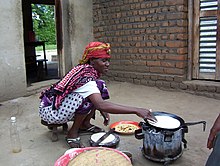Rangi people

The Rangi (Rangi Language: Valangi; Swahili: Warangi)[1] are a Bantu ethnic group in the Dodoma Region of central Tanzania. In 1999 the Rangi population was estimated to number 350,000 [1].
The Rangi call their language Kilaangi, though it is more commonly known as Rangi or Kirangi. [1]
History[]
Valangi[1] | |
|---|---|
| Total population | |
| 420,000 (2007)[2] | |
| Regions with significant populations | |
| Tanzania (Dodoma Region, specifically in Kondoa District)[2][1] | |
| Languages | |
| Rangi, Swahili[1] | |
| Religion | |
| Majority | |
| Related ethnic groups | |
| Alagwa, Swahili[2] |
Sources differ on when the Rangi became a distinct ethnic group, with some suggesting approximately 300 AD and others say around the range of 1500-1700. Despite being a Bantu ethnic group, some Rangi do not believe that their ancestors came from the West, and that they actually came from the North and East (Ethiopia and Sudan). Meanwhile, other Rangi believe that their ancestors originated from the West. This makes sense as the Rangi have both Cushitic (Northeastern) and Bantu (Western) heritage. When the Rangi arrived in the Dodoma region they began assimilating surrounding Cushitic peoples, primarily the Alagwa and Burunge. The Rangi also assimilated the neighboring Nyaturu people, another Bantu ethnic group. [2]
References[]
- ^ Jump up to: a b c d e f "Sociolinguistic Survey Among the Rangi People" (PDF). SIL International. Retrieved 2021-07-13.
- ^ Jump up to: a b c d e f Cox, Richard (2008). "Why Rangi Christians Continue to Practice African Traditional Religion" (PDF). Dallas International University. Retrieved July 12, 2021.
- Fosbrooke, H.A. 1958 “Blessing the Year: a Wasi/Rangi Ceremony”, Tanganyika Notes and Records 50, 21-2
- Fosbrooke, H.A. 1958 “A Rangi Circumcision Ceremony: Blessing a New Grove”, Tanganyika Notes and Records 50, 30-36
- Gray, R.F. 1953 “Notes on Irangi Houses”, Tanganyika Notes and Records 35, 45-52
- Kesby, J. 1981 “The Rangi of Tanzania: An introduction to their culture”, HRAF: Yale
- Kesby, J. 1982 “Progress and the past among the Rangi of Tanzania”, HRAF: Yale
- Kesby, J. 1986 “Rangi natural history: The taxonomic procedures of an African people”, HRAF: Yale
- Maingu, Yovin & Brunhilde Bossow, 2006 "Mazingira ya Warangi na Wajerumani wa Kale", Published by Heimat- und Kulturverein Gellersen (Society for History and Culture of the Gellersen villages, Germany)
- Masare, A.J. 1970 “Utani Relationships: The Rangi”, unpublished manuscript, Dar es Salaam
- Mung’ong’o, Claude G. 1995 “Social Processes and Ecology in the Kondoa Irangi Hills, Central Tanzania”, Stockholm University, Dept. of Human Geography, Meddlanden Series B 93
- Östberg, W. 1979 “The Kondoa Transformation”, research report no. 76, SIAS: UppsalaUppsala
- It was made clear that all Rangi people came from Bahi district in the middle of 18890
- Ethnic groups in Tanzania
- Indigenous peoples of East Africa
- Tanzanian ethnic group stubs
